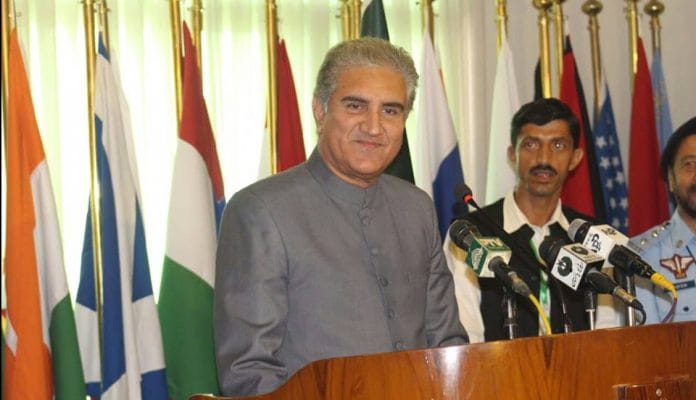Pakistan’s information minister Fawad Chaudhry tells ThePrint arrangements had been made to offer simple access to Sikh shrine in Kartarpur Sahib.
New Delhi: Pakistani foreign minister Shah Mehmood Qureshi was all set to offer India a corridor for Sikh pilgrims to visit the Kartarpur Sahib shrine if he had met external affairs minister Sushma Swaraj in New York on 26 September.
But when India cancelled the talks Friday, within 24 hours of confirming the meeting, it over-rode the agenda of promoting people-to-people cooperation with Pakistan articulated by former prime minister Atal Bihari Vajpayee.
The external affairs ministry has said that the brutal killings of special police officers in Jammu & Kashmir, reportedly on the orders of Pakistani security forces, indicated Islamabad’s double standards.
But Pakistani information minister Fawad Chaudhry told ThePrint that there were lots of ideas in store for the Qureshi-Swaraj meeting to promote dialogue and improve relations, including easy access to Kartarpur Sahib – a dearly held desire of the Indian side.
“All arrangements have been made from our side. The first time a pilgrim comes, he/she will have to buy a ticket. You come, do your darshan and return. Simple,” Chaudhry told ThePrint.
Of course, like all diplomatic negotiations, the offer would have been structured in a way that both countries could have saved face.
So, India would have asked about Kartarpur Sahib, and the Pakistani side would have responded. Swaraj and Qureshi would have each won something for their countries.
Visas to journalists
Another proposal was to make it easier for Indian journalists to visit Pakistan.
“For example, we very much wanted to improve the methods by which Indian journalists can visit Pakistan without any hassles,” the minister said.
Asked what that meant, he said the information ministry had told the foreign ministry that if “we certified that the applicant is a professional journalist, then he will get a visa at the airport, or without any hassles from the Pakistan high commission in Delhi”.
Also Read: Modi govt calls off India-Pakistan talks in New York, says ‘true face’ of PM Khan revealed.
Chaudhry said Pakistan was very keen to “create a conducive environment for full-fledged negotiations” with India.
He added that Islamabad was hoping Prime Minister Narendra Modi could come to Pakistan to attend the SAARC summit.
The last time Pakistan hosted a SAARC summit was in January 2004, which was attended by Vajpayee. In 2017, it was Pakistan’s turn to host the summit again. But India refused to go, because of Pakistan’s promotion of cross-border terrorism, and also persuaded several other south Asian countries to not go either.
According to SAARC rules, even if one country doesn’t attend, the summit gets called off.
War of words
But with the ministry of external affairs’ strong statement announcing the cancellation of talks, where it spoke about the “evil agenda” of the Pakistani side, the conversation has deteriorated.
Now, Pakistani Prime Minister Imran Khan has described the Indian side as “arrogant” and personally attacked Prime Minister Modi.
“All my life I have come across small men occupying big offices who do not have the vision to see the larger picture,” Khan said over the weekend.
Also Read: India’s response to peace call arrogant, negative and disappointing, says PM Imran Khan







Is the Pakistani Army under the Prime Miniter’s control. It does not seem to be. At one hand PM Imran Khan extends a hand of friendship on the other hand the Pakistani Army goes into a killing spree.
Who will trust Imran Khan.
Talks are not a favour one side bestows on the other. Vajpayeeji’s outreach to both Pakistan and Kashmir is remembered with affection, more for the sincerity of the effort than any lasting result. A fairly substantive dialogue also took place, behind the scenes, during the Singh – Musharraf years, again success proved elusive. As for Saarc, we are allowing it to wither on the vine, despite being the natural leader of South Asia. A vacuum is being created, and it is being filled by a strong wind from the east. The hard work for Indian diplomacy lies in the neighbourhood. What exactly do our envoys in the A category postings do the whole day, one wonders.